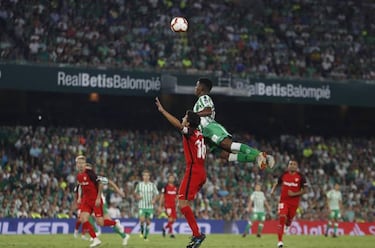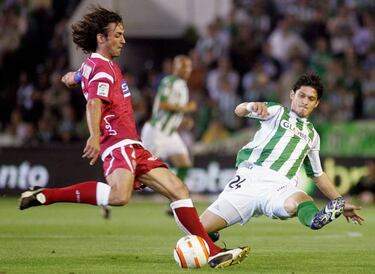The Seville derby, Spanish football's most passionate rivalry
With Seville's 'El Gran Derbi' coming up on Sunday, AS English talked to Colin Millar author of the 'Frying Pan of Spain' book about what makes this rivalry so special.


Some will say it's the derby of the Spanish capital, where Atletico now, after years of submission in derby games are now in a position to make a befitting contest against city rivals Real Madrid. Others will say it's the fierce battle for regional pride when Galicia's big two (Deportivo and Celta Vigo) face off in O Noso Derbi and others will say it's the tension that only the Asturian derby delivers.
Whatever one's view on the many city and regional derbies that Spanish football throws up, most observers are unanimous that when it comes to singling out one particular game that stands taller the the rest, it's the derby of Seville.
This Sunday at the Estadio Benito Villamarin (kick-off 21:00 CET), Real Betis face Sevilla FC in 'El Gran Derbi'. Ahead of the match, AS English caught up with author and journalist Colin Millar who has just published a book on the history of LaLiga's most passionate rivalry.

What prompted you to write a book about the Seville derby?
Seville is a wonderful place and I instantly fell in love with the city after my first visit. As an outsider visiting the city, I was taken aback by the way people felt about the football clubs in the Andalusian capital and the high level of support and passion shown for both instututions. Both football clubs have a huge amount of members (socios) and both sides can claim to have won the domestic league with Seville enjoying recent success in the Europa League winning the competition for a record five times. What also struck me researching the book was the way families can be divided by club loyalty and that adds an additional layer to the existing rivalry.

The derby has undergone a transformation in the past decade or so, what are the factors behind that?
It's true that in the 90s the derby was becoming tainted with unsavoury incidents with violent scenes between rival fans inevitably eclipsing the football and this reflected poorly on the image of both clubs and indeed of that of the city. I try and explain why this was the case at the time in the book and much of the tension had to do with the respective club presidents at both teams who were driven by high egos which helped fan the flames. Antonio Puerta's tragic death in 2007 was a major factor in changing the climate of the derby as it brought both clubs closer together and that positive relationship has altered the backdrop to the derby itself.
🔥 𝒫𝒜𝒮𝒮𝐼𝒪𝒩
— LaLiga English (@LaLigaEN) November 8, 2019
😱 𝒟𝑅𝒜𝑀𝒜
⚽ 𝒢𝒪𝒜𝐿𝒮
🙌 𝒯𝐻𝑅𝐼𝐿𝐿𝒮
🏟 𝒮𝒫𝐸𝒞𝒯𝒜𝒞𝐿𝐸
It's #ElGranDerbi on Sunday!@RealBetis_en 🆚 @SevillaFC_ENG pic.twitter.com/qVbIIi45O0
In a country gifted with some fine city and regional derbies, what, in your view makes the Seville derby that extra bit special?
Many of the big city and regional derbies (with the possible exception of the Asturian derby) generally have a tendency to see one stronger club pitted against their smaller rival, that's true in Valencia, Barcelona and although Atletico are now a massive club, historically they have lagged behind their city neighbours in the capital. The parity in Seville between both clubs through the years adds to the significance of the rivalry and both clubs are in the top echelons when it comes to most Spain's most supported clubs with Betis having the edge on a national level. There are so many elements that contribute to the fabric of the Seville derby holds and I feel that this perception of the significance behind this rivalry is not fully appreciated outside of Spain.
How would you impress upon the uninitiated about the significance of this derby?
The affiliation to either side is a culture by which people define themselves in the city. It's more than just 90 minutes of football with an almost religious devotion dedicated in supporting the green and white or red and white side of the two teams. The build up to the game starts weeks before the scheduled kick-off with preparation between both sets of fans about pre match displays closely guarded secrets. The final training session on the day before the derby can also draw crowds of 10,000 with fans desperate to wish their side well before the game itself. The sense of occasion itself leading up to the match is palpable with even non football fans feeling a unique atmosphere in the city in the lead up to the game. On match day, the buzz is unique and engulfs the city with both sets of fans seeing their side off from their hotel bases ahead of kick-off with a riot of colour and noise.
How would you compare the Seville derby to other great city rivalries on a global level ...Buenos Aires, Glasgow, Istanbul...
Related stories
I'd say that this derby is certainly up there. It has all the ingredients that a great city rivalry should have but an added layer of authenticity. The other big derbies are fascinating to watch from an outside perspective but that rawness on display is also apparent in the Seville derby but fortunately in recent time now does not manifest itself into acts of violence off the pitch.
The Frying Pan of Spain: Sevilla v Real Betis: Spain's Hottest Rivalry is now available at usual outlets.